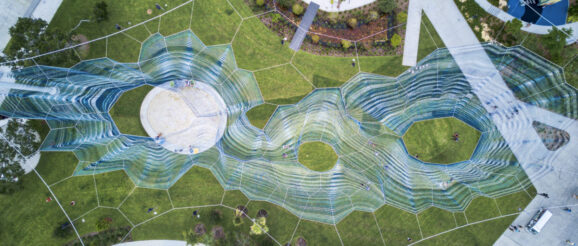Janet Echelman on her work at the St. Pete Pier, and other takeaways from FIBA’s Innovation Fusion

Aerial sculptor Janet Echelman wanted to create art for the St. Pete Pier that would reflect a movement towards justice at the downtown St. Petersburg waterfront location.

Artist Janet Echelman and FIBA Executive Dirctor Rachel Feinman at Innovation Fusion.
The result was Bending Arc, unveiled a few weeks ago when the new Pier opened.
During a keynote address at the Florida-Israel Business Accelerator’s Innovation Fusion event Wednesday night, Echelman, who grew up in Tampa, said the sculpture honors the site’s role in the civil rights movement. Protestors challenged a segregated municipal pool at the site, leading to the 1957 U.S. Supreme Court case ruling which upheld the rights of all citizens to enjoy use of the municipal beach and swimming pool without discrimination.
The title of the sculpture was inspired by a quote in a speech from the late Dr. Marin Luther King, who said, “The arc of the moral universe is long but it bends towards justice.”

A slide from Janet Echelman’s FIBA presntation showed Black Lives Matter marchers gathered at Bending Arc.
“I created a sense of arcing in the project to create this sense of justice,” Echelman said. “What’s most exciting to me is that it’s already becoming a place that people come to let their lives unfold, to safely have an outdoor place to be together … I discovered that the Black Lives Matter protests and marches happening regularly in St. Pete, many of them have chosen to end their marches under the sculpture to tell stories and continue that bending arc towards justice.”
Wednesday night’s Innovation Fusion focused on the intersection of art and technology. It was the fourth Innovation Fusion hosted by FIBA, a Tampa-based business development and community engagement project that provides a soft landing for Israeli tech companies that are ready to expand into the U.S. market.
Here are some highlights from other speakers at the online event:
• The Covid-19 pandemic has left an economic mark on Florida, said Jamal Sowell, president and CEO of Enterprise Florida.
“We really rely heavily on sales tax, tourism, because we don’t have a state income tax. Everyone knows that is down but we are seeing an uptick. As we come to the fall, we have seen more tourists come, some of the theme parks are now opening and sports are coming back. That has helped,” Sowell said.
Florida competes against California, Texas and New York to attract and retain businesses. While Florida received national attention for a large number of Covid-19 cases, it hasn’t hindered business growth, Sowell said.
“A lot of people are now working from home and companies are seeing they may not need a 10-story building because their workers are now working remote. They feel safer when it comes to those places, such as LA, San Francisco, Austin and Houston. That really has not hindered us in the way people may assume from reading the press.”
• The drastic impact many startup companies feared from Covid-19 hasn’t materialized for the most part, said Ori Kaufman-Gafter, head of international and tech banking at Bank Leumi USA. Investors initially focused on securing their portfolio companies and cutting expenses in areas such as marketing and travel.
“What we’ve seen in Israel after three or four weeks was a slow turnaround. The industry is getting back to itself,” she said.
Early-stage companies face more challenges than more established firms, and companies in the travel tech and hospitality space also are facing tough times. But companies that support work from home abilities such as cyber, cloud and healthcare IT firms are seeing an increase in demand, she said.
In addition, the peace accord between Israel and the United Arab Emirates offers opportunities for collaboration around financial technologies, digital health, cybersecurity, food tech and renewable energy, she said.
• Aviv Clinics, which uses hyperbaric oxygen therapy to treat a variety of health conditions, opened its first clinic outside of Israel in The Villages in central Florida in June and now is expanding, said Dave Globig, CEO.
“We have 30 clinicians and coworkers in The Villages. The Villages is going to be the hub of all future clinics throughout the world,” including a clinic that will open in Dubai after the first of the year, he said.
• Niio is an Israeli startup that is reimaging the way art is consumed, said Rob Anders, CEO and co-founder. The company, which calls itself “the Spotify of digital art,” provides a platform on which artists and buyers can publish and consume art. The platform includes work from about 5,000 artists and galleries from 60 countries, and the content can be delivered to any screen in any location according to different types of business models.
“While we know Israel is renowned for its technical contributions to the world in sectors such as cyber and medical and others, I think as entrepreneurs we have a responsibility to balance the technical with the human element, with the ability to inspire people. In particular right now, during this time of Covid, we need art more than ever,” Anders said.
The post Janet Echelman on her work at the St. Pete Pier, and other takeaways from FIBA’s Innovation Fusion appeared first on St Pete Catalyst.
